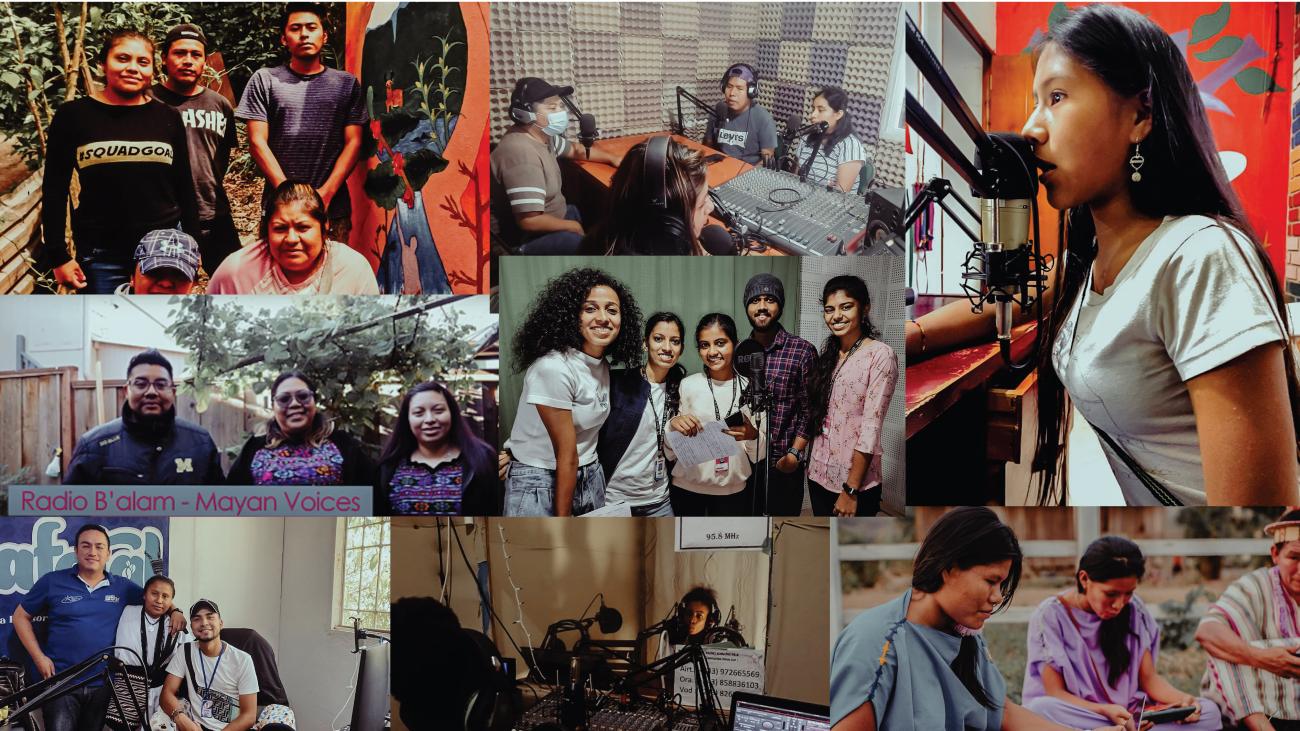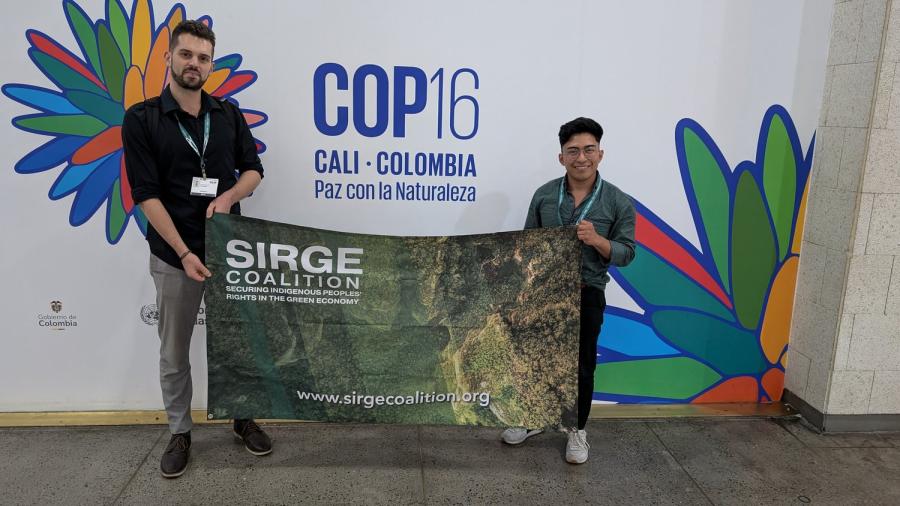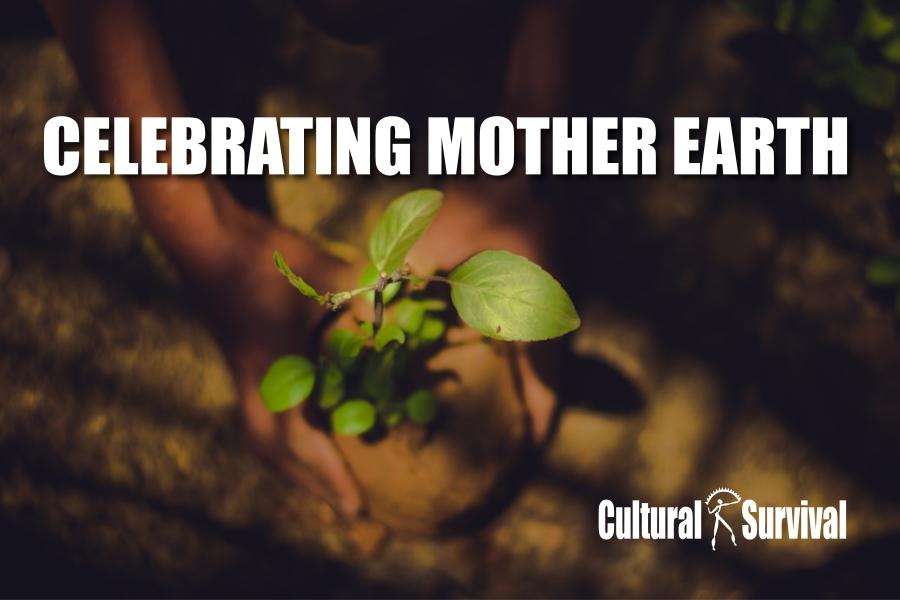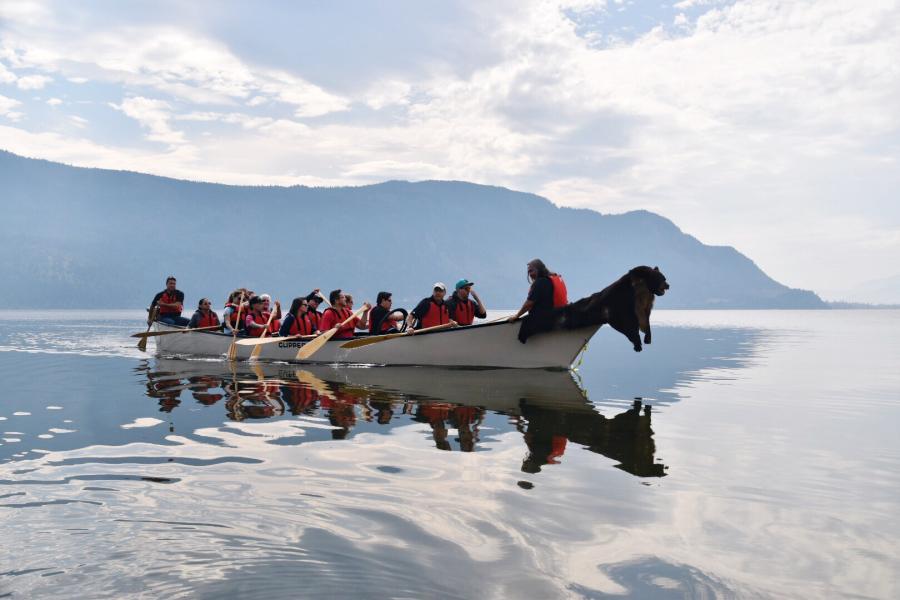
Indigenous media is key to ensuring freedom of expression and access to relevant and contextualized information for many Indigenous communities around the world. But, Indigenous communities often lack funding, mentoring, and learning opportunities to strengthen and ensure the sustainability of their work and activism in the field of Indigenous community media. The Indigenous Community Media Fund was created to address this gap.
Through the Indigenous Community Media Fund, Cultural Survival offers funding, training, and exchange opportunities to various Indigenous community media to meet their needs for infrastructure, broadband internet access, training, content production, and sustainability of their communication processes to respond continuously and relevantly to the information needs of Indigenous Peoples.
In 2022, the sixth open call for the Indigenous Community Media Fund was launched. Thanks to funding from the NoVo Foundation, the MacArthur Foundation, and the W.K.Kellogg Foundation, Cultural Survival was able to support Indigenous communities with 23 grants totaling $138,000 to Indigenous community media outlets from 13 countries: Mexico, the United States, El Salvador, Colombia, Ecuador, Peru, South Africa, Namibia, Nigeria, Congo, Nepal, Bangladesh, and India.
We strongly believe that programs and content produced by Indigenous community media strengthen the capacity of Indigenous Peoples to claim their rights and the rights of Indigenous women, revitalize Indigenous languages and cultures, as well as to respond to the COVID-19 pandemic and other public health concerns in their communities.
Meet some of our 2022 grant partners:
Radio B’alam/Mayan Voices (Maya Mam), U.S.A.
Radio B'alam/Mayan Voices is an online radio station broadcasting in Oakland, California. It was founded by a group of young Maya Mam people whose parents are migrants from Guatemala. The radio station is a platform that seeks to provide information, resources, and safe spaces for the Maya Mam-speaking population of California, United States to share their stories and build community ties. With the project, the station will provide information on vaccination and basic health services related to Covid-19, as well as information on legal services and immigrant rights in the United States. The production and content will be developed in the Mam language and in partnership with local communications professionals and reporters in Guatemala.
Radio Tsinaka (Nahua), Mexico
Radio Tsinaka is a young and autonomous FM media platform that aims to reclaim and strengthen the Nahua identity in San Miguel, Tzinacapan and other communities in the northeastern Sierra of Mexico. With the project, the station seeks to continue producing and disseminating radio content on issues relevant to the community, such as defense of territory, anti-violence, femicide, and strengthening of Nahua culture. They will carry out trainings on programming and production of radio content with a gender perspective, and they will develop a participatory evaluation with different sectors of the community to strengthen the relevance and pertinence of their production strategy and programmatic quality.
Radio Magisterial (Mixtec), Mexico
Radio Magisterial y Comunitaria La Voz de Amoltepec is located in Centro Santiago Amoltepec, Oaxaca. Its mission is to share the culture and identity of the Indigenous Peoples and communities of Amoltepec, as well as to publicize the various cultural, educational, sporting, and community activities. The project seeks to improve the infrastructure and equipment of the radio station to expand coverage in other communities and improve radio production; to promote a training process with youth announcers to encourage the participation and interest of student children in radio production; and to produce radio content in Mixtec and Spanish with information relevant to the needs and problems of the community, particularly about Covid-19 and violence against women.
Voces Afroamericanas (Afro-Mexican), Mexico
Radio Voces Afromexicanas is an initiative promoted by the Colectiva de la Costa de Oaxaca, Ña'a Tunda, whose objective is to promote the organization and development of black, Afro-Mexican, Indigenous, and mestizo women through community and family work on the coast of Oaxaca. The project seeks to revitalize and make visible, via the radio, the culture and history of the Afro-Mexican population, and to respond to the effects of the Covid-19 pandemic on the community. Among the main activities to be developed are training workshops on radio production, adaptation and installation of radio equipment to improve the spaces for radio broadcasting and recording, and radio productions in Mixteco and Spanish on Covid-19, identity, language, care for the environment, among other topics.
Radio Tosepan (Nahua), Mexico
Radio Tosepan Limakxtum is a communication media in charge of leading the communication strategy to strengthen the strategic plan of the Union of Cooperatives of Tosepan. The project that the station will implement with the support of Cultural Survival is framed within the initiative, "Tayolchikawalis united with the strength of our hearts in the face of Covid-19," which aims to inform, prevent, and organize the community in the face of the health and social risks of the Covid-19 pandemic. One of the main activities that the station will carry out is the creation and dissemination of three radio projects framed in the post Covid-19 context.
Yoltajtoli Radio (Nahua), México
Yoltlajtoli Radio was founded by a group of young people in Colatlan committed to understanding the problems and divisions in their communities. They aim to publicize the needs, problems, and injustices experienced by the Indigenous population in Colatlan, as well as their customs, traditions, and culture. With the project, the station seeks to inform and sensitize the population of Colatlan about Covid-19 and its effects on health, food, gender violence, and labor rights. This will be done through the development of workshops with various sectors of the community to identify information needs about Covid-19 in order to produce and disseminate relevant radio content. In addition, they will promote the creation of Radio Yoltajtoli’s website to improve the station’s online presence and reach.
Ve’ Savi Radialistas Comunitarios de Yucuhiti (Mixtec), Mexico
Ve' Savi Radialistas Comunitarios de Yucuhiti is a collective that arises from the commitment and motivation of its members to address the needs and problems that affect Mixtec communities through the creation and dissemination of various radio productions in the municipality of Yucuhiti, Oaxaca. With the project, the collective seeks to increase the capacities and skills in radio production of its members and the general population to develop and disseminate radio content in Mixtec and Spanish about Covid-19 and its effects on health, economy, education, commerce, and community organization in the Mixtec population.
Asociacion de Consejos de Pueblos Originarios de Cuzcatan (Náhuat Pipil), El Salvador
The Asociación de Consejos de Pueblos Originarios de Cuzcatan is an Indigenous organization whose objective is to promote the rescue, preservation, and dissemination of culture, identity, and ancestral spirituality and to promote the well being of the original Peoples of Cuzcatan through educational and productive programs and projects. Through the project, they seek to establish a written media that reflects the interests and problems that affect their communities from their worldview. They will form and train a network of Indigenous communicators who will gather information for the production, editing, and publication of four editions of the newspaper, which will include articles and interviews in Spanish and Náhuat.
Newspaper La Minga (Quillasinga), Colombia
La Minga newspaper is an initiative promoted by the Indigenous Council of Mocondino, formed by the Traditional Authorities and elected in a participatory and consensual manner by the communities that inhabit the ancestral territory of the Mocondinos, Quillasinga Nation. With the project, the Council seeks to create the first edition of the newspaper La Minga with the objective of making the communities and population of the department of Pasto aware of the culture and history of the Mocondinos so that their voice and struggles are heard, recognized, and valued. Among the main activities to be developed are workshops on journalism training and popular communication to build the capacity of the population to produce and disseminate the newspaper both physically and virtually.
Emisora Inga Kamentsa (Inga), Colombia
The Inga Kamentsa radio station is part of the Chaskikuna edu-communication component of the Plan for Life (strategic plan) of the Indigenous Cabildo of Santiago located in the department of Putumayo. Through this component, the Cabildo promotes training, research, and production of educational communication content that articulates the community around the defense and recovery of the Inga de Manoi ancestral territory and its natural sources of life. With the project they will promote the strengthening of the organizational structure of the Chaskikuna communication component and will develop training processes on communication project management and edu-communication to produce radio programs and microprograms in Inga and Spanish related to the Inga culture and historical memory.
Nasa Estéreo (Nasa Yuwe), Colombia
The objectives of the Nasa Estéreo radio station are to strengthen the organizational process of the Indigenous Councils of Toribío, Tacueyó, and San Francisco (also known as Proyecto Nasa) located in the Cauca region, as well as to revitalize the culture, language, values, histories, and struggles of the Nasa Yuwe people living in this region. Through the project, the radio will form and train three teams of young communicators from each reservation for the production and broadcasting of radio programs and public service announcements on topics relevant to the current context of their communities, such as historical memory, culture, identity, language, and defense of the territory.
Kuakumake Estéreo (Arhuaco), Colombia
Kuakumake Estéreo is a community radio station located in the Sierra Nevada. It has a multiethnic, educational, and multicultural character, and seeks the integration of different media and citizen and community communication collectives in the region. The project, "Hablar de la Verdad Indígena," seeks to contribute to the protection of the four Indigenous Peoples of the Sierra Nevada through the creation of an Indigenous Alternative Communication School whose objective is to encourage and strengthen radio production capacities for the defense of water, life, and territory of the Indigenous communities in the Sierra Nevada, and to promote the inclusion of women and youth as the fundamental axis in the struggle and activism of the Indigenous Peoples.
CARE (Asháninka), Perú
The Central Asháninka del Río is an Indigenous political organization that provides legal representation to 19 communities and 33 annexed territories of the Ene River Basin. It aims to be the bridge that articulates the defense of Indigenous rights against the interests of the State and private companies. With the project, CARE seeks to implement two recording rooms in school residences to empower students in the use of information technologies and strengthen their communication, social, artistic, and leadership skills for the creation of radio productions.
Radio Rimayninchis (Quechua), Peru
Radio Rimayninchis/Nuestras Voces is a bilingual radio program founded by the civil association Phutu, which carries out different actions and projects that aim to recover, preserve, and revitalize the Native cultures through the media to contribute to the development of the Indigenous communities of the Andes. The project seeks to continue strengthening the radio space (Rimayninchis/Nuestras Voces) so that adolescents, young people, and migrant women of the Q'eros Nation can express themselves and disseminate their ancestral knowledge in their mother tongue through radio products. Project activities include storytelling, a musical space, and five radio programs in Quechua and Spanish.
Itombwe Community Radio (Batwa), Congo
Itombwe Community Radio is a community radio station promoted by the organization Union des Peuples Autochtones pour la Paix et le Développement Endogène, located in the South Kivu Province of Congo, inhabited mostly by Indigenous people. Through the radio, the organization addresses the lack of contextualized and relevant speech and information addressed to the Indigenous Batwa Peoples in Indigenous languages. With the project, the radio will strengthen the radio's infrastructure and equipment, as well as promote trainings for journalists to produce radio programs on women's rights and Indigenous Peoples' rights in French and Swahili.
Kivu Community Radio (Batwa), Congo
Kivu Community Radio is an Indigenous community radio station recently created by the women's organization Femmes Pygmées en Action, whose mission is to contribute to the promotion of human rights and leadership of Batwa women in the South Kivu Province of Congo. The project will address the need to strengthen the capacities and skills of Batwa women to claim their human rights and develop awareness-raising messages for the population that take into account their rights and the conflictive context of their region. In addition, they will promote the strengthening of the station's infrastructure and equipment to improve its production and coverage.
Radio Infinity FM (Nama and Rehoboth), Namibia
Radio Infinity FM is a community radio station created by the Fendura Training Centre to contribute to its goal of providing educational and informational opportunities to the Hardan and Erongo communities. Today the station has a large number of listeners from the Nama and Rehoboth Indigenous Peoples. With the project, the station seeks to raise awareness of the cultural practices, history, and traditions of these two Indigenous groups through the production and broadcast of a series of radio soap operas and narrative content in Afrikaans and Khoikhoigowab Indigenous languages. This content will be widely disseminated through radio and other platforms and events with authorities and communities in the region.
Eden FM (Nama and KhoiSan), South Africa
Eden FM was founded to provide radio broadcasting services for the purpose of informing, educating, and entertaining the community in the Southern Cape of South Africa. The project will focus on empowering women teachers from the Indigenous Nama and Khoi-San people to continue teaching and revitalizing the Indigenous Nama and Khoekhoekwoab languages through the radio station. They will develop recorded lessons that will be broadcast weekly and can be rebroadcast through different platforms.
Radio Udayapur, Nepal
Radio Udayapur was founded in 2009 with the objective of serving the communities of Danuwar and Tharu, located in the Udayapur District. The station has approximately 20,000 listeners (80 percent Indigenous), with women as its main demographic group. With the project, the station seeks to respond to the identified needs for institutional strengthening and technical capacity building in the use of new technologies for radio production. They will also produce and broadcast radio programs on women's rights issues in the Tharu and Danuwar Indigenous languages.
IPNews, Bangladesh
Indigenous Peoples News (IPNEWs) is a media platform working since 2016 to protect and promote the rights, culture, and challenges of the Indigenous community of Bangladesh. The platform seeks to make visible the daily scenario and crises experienced by Indigenous people in different parts of Bangladesh to attract public attention and awareness. The IPNEWs project seeks to strengthen and expand the news network through Indigenous youth, who will be trained in basic journalism and research skills to produce and disseminate written and audio-visual content on issues affecting Indigenous communities such as land rights, women's rights, and youth rights.
Community Radio Mattoli, India
Since its foundation in 2009, Community Radio Mattoli has become the only radio station that broadcasts daily programs in Indigenous languages for the population of the Wayanad district. All programs are produced with the participation of members of Indigenous communities. Because the content is produced locally, it has greater relevance and acceptance by the local communities it serves. One of the main objectives of the project is to raise awareness and promote vaccination and immunization against COVID-19 among the Indigenous population as well as the general public. The station will carry out training processes in radio production and will broadcast programs related to COVID-19 and other topics.



